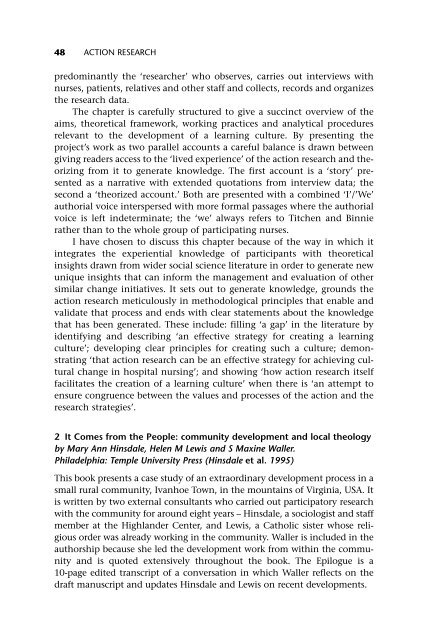Action Research A Methodology for Change and Development
Action Research A Methodology for Change and Development
Action Research A Methodology for Change and Development
Create successful ePaper yourself
Turn your PDF publications into a flip-book with our unique Google optimized e-Paper software.
48 ACTION RESEARCH<br />
predominantly the ‘researcher’ who observes, carries out interviews with<br />
nurses, patients, relatives <strong>and</strong> other staff <strong>and</strong> collects, records <strong>and</strong> organizes<br />
the research data.<br />
The chapter is carefully structured to give a succinct overview of the<br />
aims, theoretical framework, working practices <strong>and</strong> analytical procedures<br />
relevant to the development of a learning culture. By presenting the<br />
project’s work as two parallel accounts a careful balance is drawn between<br />
giving readers access to the ‘lived experience’ of the action research <strong>and</strong> theorizing<br />
from it to generate knowledge. The first account is a ‘story’ presented<br />
as a narrative with extended quotations from interview data; the<br />
second a ‘theorized account.’ Both are presented with a combined ‘I’/’We’<br />
authorial voice interspersed with more <strong>for</strong>mal passages where the authorial<br />
voice is left indeterminate; the ‘we’ always refers to Titchen <strong>and</strong> Binnie<br />
rather than to the whole group of participating nurses.<br />
I have chosen to discuss this chapter because of the way in which it<br />
integrates the experiential knowledge of participants with theoretical<br />
insights drawn from wider social science literature in order to generate new<br />
unique insights that can in<strong>for</strong>m the management <strong>and</strong> evaluation of other<br />
similar change initiatives. It sets out to generate knowledge, grounds the<br />
action research meticulously in methodological principles that enable <strong>and</strong><br />
validate that process <strong>and</strong> ends with clear statements about the knowledge<br />
that has been generated. These include: filling ‘a gap’ in the literature by<br />
identifying <strong>and</strong> describing ‘an effective strategy <strong>for</strong> creating a learning<br />
culture’; developing clear principles <strong>for</strong> creating such a culture; demonstrating<br />
‘that action research can be an effective strategy <strong>for</strong> achieving cultural<br />
change in hospital nursing’; <strong>and</strong> showing ‘how action research itself<br />
facilitates the creation of a learning culture’ when there is ‘an attempt to<br />
ensure congruence between the values <strong>and</strong> processes of the action <strong>and</strong> the<br />
research strategies’.<br />
2 It Comes from the People: community development <strong>and</strong> local theology<br />
by Mary Ann Hinsdale, Helen M Lewis <strong>and</strong> S Maxine Waller.<br />
Philadelphia: Temple University Press (Hinsdale et al. 1995)<br />
This book presents a case study of an extraordinary development process in a<br />
small rural community, Ivanhoe Town, in the mountains of Virginia, USA. It<br />
is written by two external consultants who carried out participatory research<br />
with the community <strong>for</strong> around eight years – Hinsdale, a sociologist <strong>and</strong> staff<br />
member at the Highl<strong>and</strong>er Center, <strong>and</strong> Lewis, a Catholic sister whose religious<br />
order was already working in the community. Waller is included in the<br />
authorship because she led the development work from within the community<br />
<strong>and</strong> is quoted extensively throughout the book. The Epilogue is a<br />
10-page edited transcript of a conversation in which Waller reflects on the<br />
draft manuscript <strong>and</strong> updates Hinsdale <strong>and</strong> Lewis on recent developments.

















